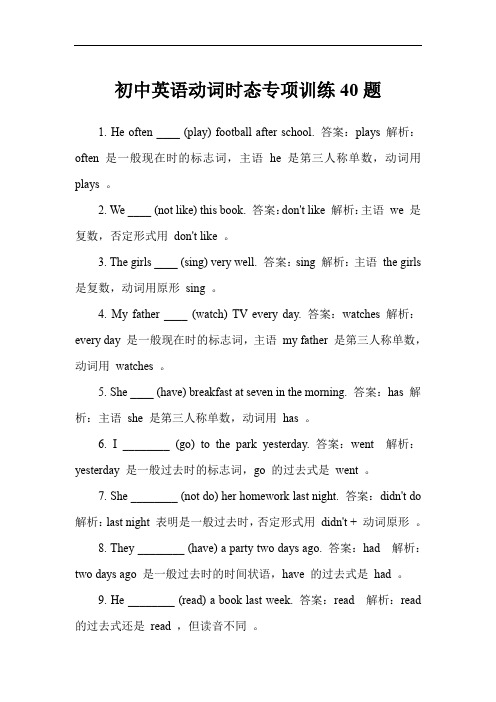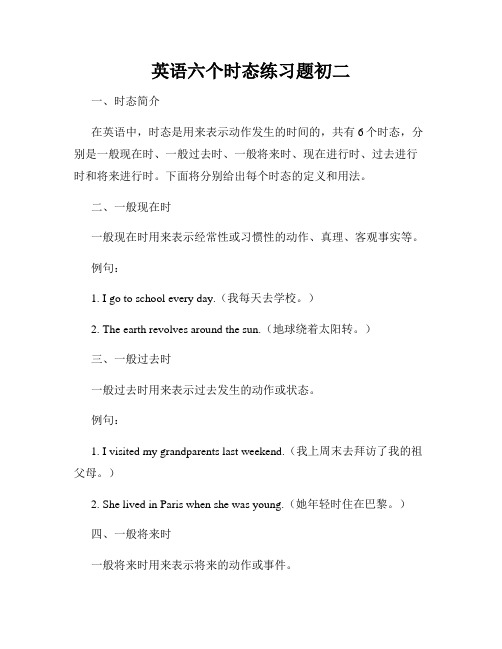初中英语时态专项训练
- 格式:doc
- 大小:35.50 KB
- 文档页数:15

初中英语动词的时态专项训练100(附答案)一、初中英语动词的时态1.— Do you know the meeting?—Tomorrow morning.A.when they hadB.when they are going to haveC.when did they haveD.when are they going to have【答案】B【解析】【详解】句意:一一你知道他们什么时候来开会吗?一一明天早上。
此题考查宾语从句,宾语从句要用陈述句语序,C和D是疑问句语序,故排除;根据回答Tomorrow morning可知此句时态是一般将来时,A是一般过去时,B是一般将来时;故选B。
2.I think I _____ my new project tomorrow.A.startB. startedC. will start D . was starting【答案】C【解析】句意:我想我明天将要开始我的新项目。
本题考查动词的时态。
A. start开始,是动词原形 B. started开始,是动词的过去式 C. will start将要开始,是动词的将来时 D. was starting就要开始,是过去将来时。
根据句意选C。
3.-Has your cousin arrived in Beijing yet?--Yes. She _______ Beijing since yesterday morning.A. arrived inB. has arrived inC. has been inD. has been to【答案】C【解析】句意:你表弟到北京了吗?-是的。
她从昨天起就在北京了。
since yesterday morning自昨天早晨以来,表示的是截止到目前为止的时间段,用于现在完成时态,排除A; arrived 为短暂性动词,不能与表示一段的时间状语连用;have been to表示某人去过某地,也不能与表示一段的时间状语连用,故答案为C。

初中英语动词的时态专项训练及答案一、初中英语动词的时态1.–Have you seen yesterday’s TV play? I think Mary won’t marry the rich man.–I agree. Unless the man finally ________ his mind to helpthe poor.A.change B.changes C.changed D.will change【答案】B【解析】句意:你看过昨天的电视剧吗?我想玛丽不会嫁给那个有钱人的。
-----我同意。
除非这个人最终改变主意去帮助穷人。
unless引导的条件状语从句用一般现在时态表将来,故答案为B。
2.—Shall we play tennis now?—Sorry, I can’t. I my homework.A.do B.did C.have done D.am doing【答案】D【解析】句意:——我们现在打网球去好吗?——对不起,我不能去,我在做作业。
A. do做,用于一般现在时态,主语复数时;B. did做,用于一般过去时态;C. have done做,用于一般现在完成时态;D. am doing做,用于现在进行时态,主语是I时;根据now可知用现在进行时态,故选D3.—May I speak to Mary?—Hold on, please.She_______in the kitchen.A.has cooked【答案】D【解析】句意:——我可以让玛丽接电话吗?——请不要挂断电话。
她正在厨房做饭。
根据Hold on,please.可知此处表示现在让对方别挂断电话,应是表示他找的玛丽正做某事,故用现在进行时be doing,故选D。
B.cookedC.will cookD.is cooking4.Ken, can you turn down the music a little? I_________ to study for my test.A.am trying B.try C.tried D.have tried【答案】A【解析】句意:Ken,你能把音乐调小一点吗?我正在设法为我的考试研究。

初中英语动词时态专项训练40题1. He often ____ (play) football after school. 答案:plays 解析:often 是一般现在时的标志词,主语he 是第三人称单数,动词用plays 。
2. We ____ (not like) this book. 答案:don't like 解析:主语we 是复数,否定形式用don't like 。
3. The girls ____ (sing) very well. 答案:sing 解析:主语the girls 是复数,动词用原形sing 。
4. My father ____ (watch) TV every day. 答案:watches 解析:every day 是一般现在时的标志词,主语my father 是第三人称单数,动词用watches 。
5. She ____ (have) breakfast at seven in the morning. 答案:has 解析:主语she 是第三人称单数,动词用has 。
6. I ________ (go) to the park yesterday. 答案:went 解析:yesterday 是一般过去时的标志词,go 的过去式是went 。
7. She ________ (not do) her homework last night. 答案:didn't do 解析:last night 表明是一般过去时,否定形式用didn't + 动词原形。
8. They ________ (have) a party two days ago. 答案:had 解析:two days ago 是一般过去时的时间状语,have 的过去式是had 。
9. He ________ (read) a book last week. 答案:read 解析:read 的过去式还是read ,但读音不同。

英语六个时态练习题初二一、时态简介在英语中,时态是用来表示动作发生的时间的,共有6个时态,分别是一般现在时、一般过去时、一般将来时、现在进行时、过去进行时和将来进行时。
下面将分别给出每个时态的定义和用法。
二、一般现在时一般现在时用来表示经常性或习惯性的动作、真理、客观事实等。
例句:1. I go to school every day.(我每天去学校。
)2. The earth revolves around the sun.(地球绕着太阳转。
)三、一般过去时一般过去时用来表示过去发生的动作或状态。
例句:1. I visited my grandparents last weekend.(我上周末去拜访了我的祖父母。
)2. She lived in Paris when she was young.(她年轻时住在巴黎。
)四、一般将来时一般将来时用来表示将来的动作或事件。
例句:1. I will meet my friends tomorrow.(我明天会和我的朋友们见面。
)2. They are going to travel around the world next year.(他们明年将会环游世界。
)五、现在进行时现在进行时用来表示正在进行的动作。
例句:1. She is studying in the library right now.(她正在图书馆学习。
)2. They are playing soccer in the park.(他们正在公园踢足球。
)六、过去进行时过去进行时用来表示过去某一时刻正在进行的动作。
例句:1. They were watching a movie at that time.(他们当时正在看电影。
)2. I was cooking dinner while she was doing her homework.(当她做作业时,我正在做晚饭。
)七、将来进行时将来进行时用来表示将来某一时刻正在进行的动作。

(英语)初中英语动词的时态专项训练及答案及解析一、初中英语动词的时态1.---Have you ever been to Harbin?---Yes. I ________ there when I was twelve for the Ice and Snow Festival.A.have goon B.have been C.went D.had been【答案】C【解析】【详解】句意:——你曾经去过哈尔滨吗?——是的,当我十二岁的时候去了冰雪节。
这里是when 引导的时间状语从句,主语用一般过去时态,这里用go的过去式went。
根据题意,故选C。
2.The life we were used to _______ greatly since 1992.A.change B.have changed C.changing D.has changed【答案】D【解析】试题分析:句意:我们过去的生活自从1992年后有了巨大的变化。
本题需要断句正确,we were used to作句子主语的定语,句子缺少谓语动词,根据时间状语since 1992,可知句子的谓语用现在完成时态,主语是the life 用第三人称has changed,故选D。
考点:考查完成时态的用法。
3.—Could you tell me what he said just now?—Sorry, I ___ about what I would do tomorrow.A.will think B.was thinking C.thought D.think【答案】B【解析】【详解】句意:你能告诉我他刚才说什么吗?对不起,我正考虑明天我要做什么。
考查时态。
A. will think(一般将来时);B. was thinking(过去进行时);C. thought (一般过去式);D. think(一般现在时);根据句意,“考虑”这个动作发生刚才在他讲话的时候,在过去某个时间点发生的动作用过去进行时,故选B。

四个时态练习题初二一、一般现在时练习题一、选择正确的动词形式填空。
1. The sun (rises, is rising) in the east.2. We usually (go, are going) to school by bus.3. My sister often (reads, is reading) books in her free time.4. The train (leaves, is leaving) at 8 o'clock every morning.5. They (have, are having) dinner together every Sunday.二、根据括号内的提示词,用一般现在时翻译下列句子。
1. 我们在学校学习英语。
(study)2. 他们每天早晨做饭。
(cook)3. 猫喜欢吃鱼。
(like)4. 我们通常在晚上看电视。
(watch)5. 妈妈经常买水果。
(buy)三、写出下列动词的第三人称单数形式。
1. do2. go3. study5. watch二、一般过去时练习题一、选择正确的动词形式填空。
1. Last night, I (watched, am watching) a movie with my friends.2. We (visited, are visiting) the museum last Sunday.3. He (studied, is studying) English two years ago.4. Sarah (played, is playing) soccer after school yesterday.5. They (ate, are eating) dinner at a restaurant last night.二、根据括号内的提示词,用一般过去时翻译下列句子。
1. 我昨天在公园里踢足球。
专题五时态复习(一)一般现在时复习要点:1•用法2•时间3•句型转换一、用词的适当形式填空。
1.Miss Guo ____________ (teach) us Chin ese this term. She _____________ (be) a very good teacher. She ofte n ________ (talk) with us after class. Many of us like ____________ (talk) with her.2.Where ___________ their father _________ (work)? He ____________ (work) on a farm.3.What time ___________ the shop ____________ (close)? It ________ (close) at nine o'clock in the eve ning.4.He__________ (go) to school by bus every day.5.Tom can not walk fast because he ________________ (carry) a heavy box.6.She ofte n __________ (read) En glish in the eve ning.7.She_______ (go) to school at eight 'lock.8.He usually __________ up at 17:00. (get)9.She_______ (live) in Beiji ng.二、句型转换:1.1 like the red sofa.变否定句)2. She has a nice cap.变一般疑问句,并做肯定及否定回答)3. I am a bus driver.变一般疑问句并做肯定回答)4.They play football in the garden everyday.变成否定句)5.There is an egg in the basket变成复数形式的句子)(二)一般过去时复习要点:1•用法2•时间3•句型转换一、将下列动词变成过去式。
一般现在时用法专练一、用括号内动词的适当形式填空。
1. He often (have) dinner at home.2. Daniel and Tommy (be) in Class One.3. We (not watch) TV on Monday.4. Nick (not go) to the zoo on Sunday.5. they (like) the World Cup?6. What they often (do) on Saturdays?7. your parents (read) newspapers every day?8. The girl (teach) us English on Sundays.9. She and I (take) a walk together every evening.10. There (be) some water in the bottle.11. Mike (like) cooking.12. They (have) the same hobby.13. My aunt (look) after her baby carefully.14. You always (do) your homework well.15. I (be) ill. I’m staying in bed.16. She (go) to school from Monday to Friday.17. Liu Tao (do) not like PE.18. The child often (watch) TV in the evening.19. Su Hai and Su Yang (have) eight lessons this term.20. -What day (be) it today?-It’s Saturday.二、按照要求改写句子1. Daniel watches TV every evening.(改为否定句)2. I do my homework every day.(改为一般疑问句,作否定回答)3. She likes milk.(改为一般疑问句,作肯定回答)4. Amy likes playing computer games.(改为一般疑问句,作否定回答)5. We go to school every morning.(改为否定句)6. He speaks English very well.(改为否定句)7. I like taking photos in the park.(对划线部分提问)8. John comes from Canada.(对划线部分提问)9. She is always a good student.(改为一般疑问句,作否定回答)10. Simon and Daniel like going skating.(改为否定句)三、翻译1.他在第三小学上学。
英语动词时态练习一般现在时练1. 她(常常/从不)喝咖啡。
2. 你经常在家吃饭吗?3. 他们喜欢看电影吗?4. 我妈妈每天晚上都(在家做饭/叫外卖)。
5. 我们(经常/很少)去公园玩。
现在进行时练1. 你现在在干什么?2. 他们正在看电视吗?3. 她每天早上都在跑步。
4. 我们(正在做作业/已经做完了作业)。
5. 他现在(在研究/在玩手机)。
过去时练1. 昨天他去了哪里?2. 你昨天晚上做了什么?3. 他们上个周末去了海边。
4. 我们(昨天/上个月)去了韩国旅行。
5. 她昨晚(看了电影/打了游戏)。
过去进行时练1. 昨天下午三点钟他在做什么?2. 你们昨晚九点还在做作业吗?3. 他们去年这个时候正在旅游。
4. 我们(两年前/去年这个时候)都还在上学。
5. 她昨天晚上七点一直在跟朋友聊天。
一般将来时练1. 你下个月的计划是什么?2. 他们周末要去哪里?3. 我们明年要搬家。
4. 你们什么时候结束考试?5. 我们明年放假时要去旅行。
现在完成时练1. 你有没有去过中国?2. 她已经吃过晚饭了吗?3. 他们今天早上已经去上课了。
4. 我们(从来没有/已经)去过非洲。
5. 我们上个星期刚刚完成了这个项目。
过去完成时练1. 他们到达机场的时候航班已经起飞了。
2. 你们昨天晚上八点已经回家了吗?3. 我们去年已经交了税。
4. 他们在我们到达之前已经抵达了。
5. 我们去过很多国家,但从来没有去过南极洲。
以上是英语动词时态的练习题,希望对大家的英语学习有所帮助。
(英语)初中英语动词的时态专项训练及答案及解析(英语)初中英语动词的时态专项训练及答案及解析一、初中英语动词的时态1.---Have you ever been to Harbin?---Yes. I ________ there when I was twelve for the Ice and Snow Festival.A.have goon B.have been C.went D.had been【答案】C【解析】【详解】句意:——你曾经去过哈尔滨吗?——是的,当我十二岁的时候去了冰雪节。
这里是when引导的时间状语从句,主语用一般过去时态,这里用go的过去式went。
根据题意,故选C。
2.The life we were used to _______ greatly since 1992.A.change【答案】D【解析】试题分析:句意:我们过去的生活自从1992年后有了巨大的变化。
本题需要断句正确,we were used to作句子主语的定语,句子缺少谓语动词,根据时间状语since 1992,可知句子的谓语用现在完成时态,主语是the life用第三人称has changed,故选D。
考点:考查完成时态的用法。
B.XXX.—Could you tell me what he said just now?—Sorry, I ___ about what I would do tomorrow.A.will think【答案】B【剖析】【详解】句意:你能告诉我他刚才说什么吗?对不起,我正考虑明天我要做什么。
考查时态。
A. will think(普通将来时);B. was thinking (曩昔举行时);XXX(普通曩昔式);D. think(普通目前时);根据句意,“斟酌”这个举措产生适才在他发言的时候,在曩昔某个工夫点产生的举措用曩昔举行时,故选B。
B.XXX4.I_______this mobile phone online. It is not worth buying.A.XXX【答案】C【解析】【详解】句意:我在网上查过这部手机。
时态专项训练一.一般现在时1.构成: (1) be: am/is/are (2) do: do/does2.标志词:always, usually, often, sometimes, never, every day /week/month/year/…二、一般过去时1..构成:(1)be: was/were (2) do: did2.标志词:yesterday, the day before yesterday, three days ago, last night/wee k/month…, in the past;just now=a moment ago三、一般将来时1.构成:(1)will +be/do (2) be going to +be/do2.标志词:tomorrow, the day after tomorrow, in three days, in (the) future, next week/month/term…, from now on...四、现在进行时1.构成:am/is/are +v-ing2.标志词:now, at the moment, Look! Listen! Be quiet!…3.注意(1)下列这些动词一般不用于现在进行时态的句子中:see, hear, like, love, want, would like, be,have, know, think, forget等(2)有几个瞬间动词可以用现在进行时表将来,如:begin, start, come, go, leave, arrive, fly等。
五、过去进行时1.构成:was/were +v-ing2.标志词:at that time, this time yesterday, then, at that moment,at 8 last night, when sb. did sth.注意在含有when或while引导的时间状语从句的主从复合句中过去进行时的运用:1)主句中的动作先于从句中的动作发生,且进行的时间较长时,主句用过去进行时(从句用一般过去时)。
eg: When the UFO arrived, I was watching TV.2)从句中的动作先于主句中的动作发生,且进行的时间较长时,从句用过去进行时(主句用一般过去时)。
eg: While I was walking in the street, the accident happened.3) 若主、从句动作同时发生或无所谓先后时,主从句可同时使用过去进行时,此时的时间状语从句一般由while引导。
eg: I was doing my homework while my parents were doing the chores.1注意:在上述情况下,若动词为表示状态的延续性动词,一般都应用一般过去时,而不用过去进行时。
eg: Luckily, when I went to see him, he was at home.练习:()1. I don’t really work here. I ____ until the new secretary _______.A. just help out; comesB. have just helped out; will comeC. am just helping out; comesD. will just help out; has come()2. At that time he _____ in the library.A. workedB. had workedC. was workingD. would work()3. The students ____ busily when Miss Brown went to get a book she____ in the office.A. were working; had leftB. worked; leftC. had worked; leftD. were working; would leave()4. --- Hey, look where you are going! --- Oh, I’m terribly sorry. _______.A. I’m not noticing.B. I wasn’t noticing.C. I haven’t noticed.D. I didn’t notice.()5. He ______ a book a bout China last year, but I don’t know ifhe ______ it.A. wrote; has finishedB. was writing; has finishedC. was writing; had finishedD. wrote; will finish()6. As she ______ the newspaper, Granny _______ asleep.A. read; was fallingB. was reading; fellC. was reading; was fallingD. read; fell()7. The last time I _________ Jane she __________ cotton in the fields.A. had seen; was pickingB. saw; pickedC. had seen; pickedD. saw; was picking六、现在完成时1.结构:(1)be: have/has been (2)do: have/has done2.标志词:already, just, yet, ever, never, so far(till now/up to now), recently, in the past 3 years, before, since+时间点,for+时间段注意延续性动词与非延续性动词的用法①非延续性动词不可与表示一段的时间状语连用。
eg: The poor old man has died.The poor old man has d ied for three years. (×)The poor old man has been dead for three years.但在否定句中,可以与表示一段的时间状语连用。
eg: He hasn’t come here for several days.②非延续性动词与一段时间状语连用可采用下述三种方法:1)将非延续性动词转化为延续性动词:come→ be here, go→ be there, die→ be dead,borrow→ keep, buy→ have, leave→ be away,join→ be in/be a …member, begin to study→ study,finish→ be over, get up→ be up, put on→ wear,catch a cold→ have a cold, wake up→ b e awake,fall asleep→ be asleep, arrive/get→ be,lose→ not have, leave→ be away from练习:()1. I________ this book for two weeks. I have to return it now.A. borrowedB. have borrowedC. keptD. have kept()2.—Why not go to see the flower show with us? --I ________ it.A. sawB. had seenC. seeD. have seen()3.—I ________ women new CDs. --When _______ you _______ them?--Yesterday morning.A. buy, did, buyB. buy, do, buyC. have bought, did, buyD. have bought, did, buy()4. I first met Tom 10 years ago. He _______ in a radio factory at that time.A. had workedB. has workedC. was workingD. has been working一般现在时练习一、用所给词的适当形式填空。
1. He often ________________(have) dinner at home.2. The girl______________ (teach) us English on Sundays.3. She and I ________(take) a walk together every evening.4. There _____________(be) some water in the bottle.5. Mike __________________(like) cooking.6. My aunt____________ (look) after her baby carefully.7. You always_____________ (do) your homework well.8. She __________(go) to school from Monday to Friday.9. Liu Tao __________________(do) not like PE.10. The child often __________(watch) TV in the evening.二.根据要求改写句子1. My dog runs fast.否定句:一般疑问句:2. Mike has two letters for him.一般疑问句:否定句:3. I usually play football on Friday afternoon.否定句: 一般疑问句:划线提问4. Su Yang usually washes some clothes on Saturday.否定句: 一般疑问句:划线提问:5. Mingming usually waters the flowers in the garden.否定句: 一般疑问句:划线提问6. Tom does his homework at home.否定句: 划线提问现在进行时练习一.用括号中动词的适当形式填空:1. Look. Three boys _______________(run).2. What __________ your mother __________(do)now?3. ___________ your dog ___________ now?(sleep)4. Look, Miss Chen _______________ football.(play)5. Now Class 3 and Class 4_________(have)a test.6. Listen, someone ___________(sing)in the classroom.7. What are you _____________(do) now? I _______________(eat) bread.8. It’s nine o’clock. My father_________(work) in the office.9. ____________he______________(clean) the classroom?No, he isn’t. He________________(play).10. Where is Mark? He_______________(run) on the grass.11. Listen, who____________(sing) in the music room? Oh,Mary__________(sing) there.12.-- (do) ___________you like animals? -- Yes, I ________--What are you _________? --I am ________ my homework.13. My sister likes __________. She can _________well. Now she is ___________(dance)14. Her parents can _________.They like ___________.They are___________now.(swim)15.You can't see her now; she_________(have)a bath.16.My parents__________(grow)older and older.一般将来时专项练习一、单项选择。